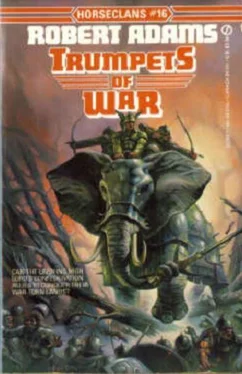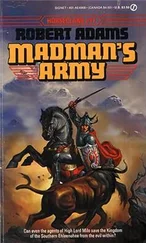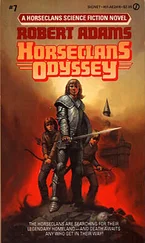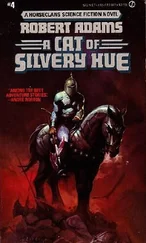Due to the horse sizes and the amount of armor that the Horseclansmen wore, Pahvlos classed them in his mind as medium-heavy horse. And it comforted his mind no little that he now possessed a reliable mounted force that could both lay down a dense and accurate loosing of arrows, then case their bows, draw their steel and deliver a hard, effective charge against whatever unit their arrow-rain had weakened.
After talking withvarious of the older Horseclans warriors and observing them for some weeks, Pahvlos thought he could understand much of how these men and their forefathers had so readily rolled over the armies of Kehnooryos Ehlahs, the Kingdomof Karaleenos, assorted barbarian principalities of the farther north and numerous tribes of mountain barbarians.
As he thought on his mounted troops, Pahvlos could not consider the reinforced squadron of Captain Thoheeks Portos just a normal unit of lancers, either. Equipped and mounted as they all were, they were become, to the old strahteegos’ way of thinking, true heavy horse, and he utilized them as such, requesting and eventually receiving of the Council a squadron of old-fashioned Ehleen light-horse lancers to assume the scouting, flank-guarding and messenger functions of the traditional light-horse usage.
To Portos’ questions regarding the reassignment of functions of his squadron, Pahvlos replied, “My lord Thoheeks, in my mind, if you dress man up in steel helmet, thigh-length hauberk, mail gauntlets and steel-splinted boots, arm him with lance, saber, light axe and a long shield, then put him up on a sixteen- or seven-teen-hand courser all armored with steel and boiled leather, then that man is no longer a mere lancer. He is become at the very least a medium-heavy horseman. That force you continue to call lancers differ from Lord Pawl Vawn’s force only in that his are equipped with bows rather than lances and carry round targes instead of horseman’s shields.”
Although inordinately pleased with all of his cavalry, both the native and the barbarian, Komees Pahvlos found himself to be not quite certain just what to make of or do with the most singular pikemen of Captain Guhsz Hehluh.
Unless they chanced to be the picked foot-guards of a king or of some other high, powerful, wealthy nobleman, Southern Kingdom pikemen simply were not and had never ever been armored, save for a light cap of stiffened leather and narrow strips of iron, a thick jack of studded leather and a pair of leather gauntlets that in some rare instances had been sewn with metal rings, and only the steadier, more experienced and more dependable front ranks were provided with a body-shield to be erected before them where they knelt or crouched to angle their pikes. And, also traditionally, they had always died in droves in almost all battles whenever push came to shove, and this had always been expected.
But such was not so in the cases of the big, fair-skinned, thick-thewed barbarians commanded by Captain Hehluh. Only the cheek-guards and chin-slings of their helmets were of leather; all of the rest—the crown-bowls, the segmented nape-guards, the adjustable bar-nasals—were of good-quality steel. Their burly bodies were protected to the waist and their bulging arms to a bit below the elbow by padded jacks of canvas to which had been riveted overlapping scales of steel. Both their high-cuffed leather gauntlets and their canvas kilts were thickly sewn with metal rings, and, below steel-plate knee-cops, their shins were protected by splint armor riveted to the legs of their boots.
Moreover, each and every one of these singular pikemen bore a slightly outbowed rectangular shield near two feet wide and about twice that length. On command, each man could quickly unsling that shield, fit it to his arm and raise it above his head in such a way as to over- and underlap those about him and thus provide a covering that would turn an arrowstorm as easily as a roof of baked-clay tiles turned a rainstorm.
Nor were these the only differences in the arming and equipage of the barbarian foot and those of the onetime Southern Kingdom. Aside from his fifteen-foot pike, your traditional pikeman bore no weapons other than a single-edged knife that was, in practice, used mostly for eating purposes. In contrast to this, not a one of Captain Hehluh’s pikemen but also bore a heavy double-edged sword that was almost two feet in its sharp-pointed steel blade. Other weapons and the numbers of them seemed to be a matter of personal choice; knives, dirks and daggers of various lengths and sizes were carried, sometimes even short-hafted axes or cleavers, such as could be utilized as tools, hand weapons or missiles.
Even their pikes were different. Ehleen pikes ran thirteen to fifteen feet in the haft, the steel point usually being six to eight inches long, narrow and of a triangular or a square cross-section; ferrules were never of iron or steel, rarely of brass, usually of horn. The pikes of Hehluh’s men, however, were much longer to begin—some eighteen feet in the ashwood haft—with a reinforced blade point that was single-edged (so being capable of being used to cut the bridles of riders, for one thing) and a foot or more long, with iron-strip barding that was riveted along the haft from the base of the point for a good two feet to prevent swords and axes lopping off pikepoints. Ferrules were of wrought iron and nearly as long as the points; however, the overall weight thus added to the weapon was compensated for somewhat by the added balance imparted and by the availability of a last-ditch weapon to be afforded the pikeman by reversing his haft and making use of the blunt iron point.
Burdened as they thus were, Grand Strahteegos Komees Pahvlos had at the outset entertained fully understandable doubts that these overprotected, overequipped, overarmed pikemen would be capable of maintaining the needful pace on the march or in a broad-front pike charge; but those doubts had evaporated after he had put them to it. Those doubts had evaporated to be replaced in his open mind with an intensely troubling set of other doubts.
These new doubts began to breed in him changes of his formerly rock-hard opinions. He began to wonder just why so many generations of his forebears had carelessly, needlessly sacrificed so many other generations of common pikemen with the excuse—now proven patently false—that proper armor and secondary weapons would significantly decrease mobility. Moreover, Captain Bizahros agreed with him and had initiated formal requests for at least basic pieces of armor, real helmets and shortswords for his reorganized Fifth Foot. On the other hand, Captain Ahzprinos did not agree with Pahvlos—flatly, loudly, unequivocally and at very great length citing all of the old, traditional arguments as well as some new-thought ones of his own.
Slowly, the force began to become a true, almost complete, field army as certain specialist units were assembled, trained or hired on. One of Council’s traveling recruiters found and sent marching back to Mehseepolis two battalions of light infantry—one of dartmen, one of expert slingers equipped with powerful pole slings. Eeahtrohsee came with their ambulance wagons, bandages, little sharp knives, bone saws and ointments. Artificier and pioneer units were organized and assigned and fully equipped. An experienced quartermaster officer was found and—miracle of miracles for his breed—proved out to be a relatively honest man! They all trickled in—the cooks, the butchers, the smiths, the farriers, the wagoneers and muleskinners, the herders, the bakers and all of them with their assistants and /or apprentices and/or servants and /or slaves. And still no war-elephants arrived.
Under the overall supervision of the Grand Strahteegos and his new quartermaster, vast mountains of supplies began to be amassed and needed to be placed under guard in such manner as to prevent or retard possible spoilage or damage or pilferage. But there was no trace or word regarding elephants from the west.
Читать дальше












